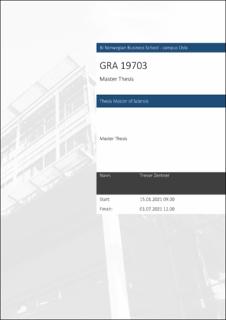| dc.description.abstract | The central purpose of this paper is to take a step towards uncovering the
determinants and persistence of profitability. To this end, the paper will employ
various measures of profitability, derived from De Loecker, Eeckhout, and Unger
in their paper called “The Rise of Market Power” (RMP). These measures will
then be empirically analysed and interpreted in three distinct parts. First, the
primary findings of RMP will be replicated and the key profitability measures
selected. Secondly, persistence will be analysed and interpreted. Lastly, proxies
will be used to estimate determinants of profitability. All these steps will be
carried out at the firm and industry level. This will aid in elucidating the relevance
of each theory presented before the conclusion.
All inputs of a service or product have an associated quantitative
compensation, in return for their value added. Although as abstract and intangible
as this value appears, it is nonetheless a real amount. Unfortunately, the
complexity of measuring this amount is very cumbersome. But it is not futile. As
with any seemingly complex enigma, time and research uncovers these true
numbers and concepts. Since we face the behemoth of intricacies now, our first
estimates must be based on simpler measures. Akin to how history started with
Newtonian physics, before the more eluding general relativity and quantum
mechanics came to front. Despite the common place of science in today’s world,
the business world far too often doesn’t embrace it as it should. We tend to accept
business leaders as exceptional experts, but their prominence can overshadow
their methodology. I would argue too many leaders today base their
understandings on weak evidence. This evidence may be based on experience, or
the disturbing business dogma and expert hunches. I am not denying the
advantages of using past personal experiences. I am pointing at its often inferiority
to the scientific method. Take Sigmund Freud for example. He based all his
insights informally off past experiences (his own life and client sessions). He
chose, through his own opinion, which experiences were most important. Far from
scientific, and today many of his theories are highly controversial or deemed
impossible to test. Yet his innovative conceptions popularized psychology and he
left an indelible mark on the field. But to yield direct practical results the scientific
method is needed. Thus, after Freud, psychology transitioned to a more scientific
approach. I would argue that we have far too many persuasive and creative executives today, akin to Freud, who lack the scientific rigor. Like the field of
psychology, the business world must take a more scientific basis to progress. This
paper acts to take the scientific approach, in part, the way an executive would do.
The main difference is that I am taking a macro perspective (looking at all firms),
while a business leader would be most concerned with their specific firm or
industry. The field of economics already provides the tools to help understand the
profit phenomena. Therefore, econometrics is at the heart of this analysis.
Lastly, I want to thank Professor Nenov who guided me through this
whole process. His knowledge and talents were indispensable, allowing me to
learn and write a far better paper than I ever could alone. I could not have asked
for a better supervisor; thus, I greatly thank him. | en_US |
